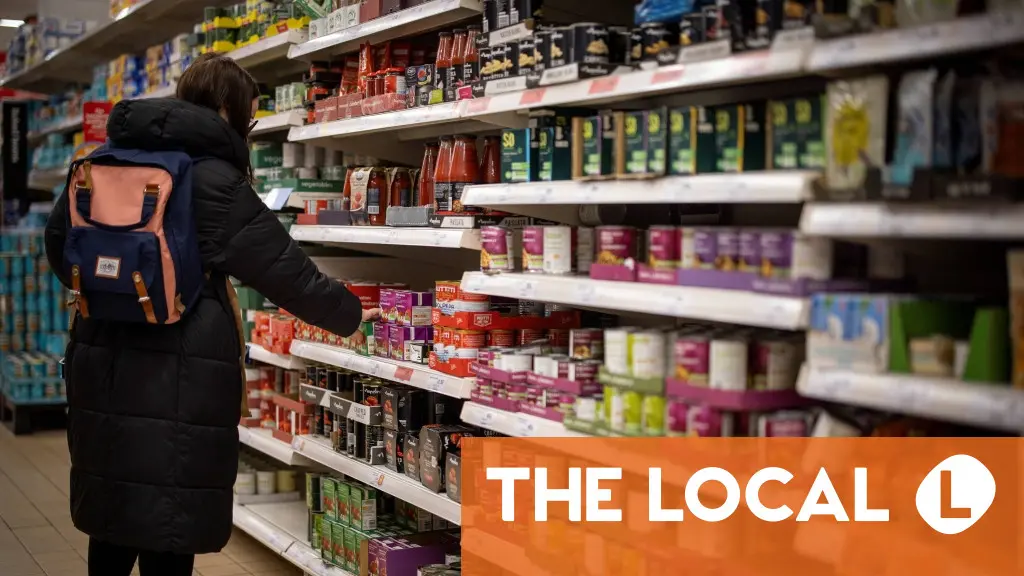This week, we look at a contested proposal to raise Italy’s cash payments ceiling (again), plus why the government has declared war on “Italian-sounding” pasta sauces.
Inside Italy is our weekly look at some of the news, talking points and gossip from Italy that you might not have heard about. It’s published each Saturday, and members can receive it directly to their inbox by going to their newsletter preferences or adding their email to the sign-up box in this article.
As Italy’s proposed 2026 budget bill works its way through parliament, plans to hike taxes on short-term rental income and increase a contested flat tax for wealthy foreign residents have been at the centre of intense public debate in recent weeks.
But as both measures continue to spark discussions among political commentators, a budget proposal by PM Giorgia Meloni’s Brothers of Italy party to raise the country’s cash payments cap has so far received relatively little attention – and undeservedly so.
As things stand, any purchase of up to €5,000 can be made in cash in Italy, while all transactions over that threshold must be made via a “traceable” means of payment such as a credit or debit card, bank transfer, or cheque.
Under the Brothers of Italy proposal, the cap on contante would be raised to €10,000 from January 1st. Any cash payment between €5,001 and €10,000, however, would be subject to a €500 “special stamp duty” to be paid directly by the buyer.
If approved by parliament, the move would mark the second increase under Meloni’s tenure, after the limit was first raised from €2,000 to €5,000 in January 2023 under hazy plans to “help the poor”.
So far, none of Italy’s ruling coalition members has publicly commented on the measure, offering no clue as to why a country whose shadow economy is estimated to be worth 182.6 billion is even considering raising its cash payments limit for the second time in four years.
Meanwhile, critics have already slammed the proposed change as a “big gift” to tax dodgers, warning that a higher cash payment ceiling would exacerbate Italy’s chronic tax evasion problems and dampen anti-money laundering efforts.
Angelo Greco, lawyer and founder of legal information platform La legge per tutti, said on Thursday that the measure was a “preemptive amnesty” for tax evaders, adding that the government was trying to “monetise illegality”.
“Why would you pay a €500 tax to spend your own money when a bank transfer or card payment is free of charge? There’s only one answer: because that money can’t go through a bank,” Greco said.
As is the case for all other proposed budget measures, the cash cap increase is still a long way from final approval and could be subject to major revisions before the December 31st deadline.
But if there’s anything that the current administration has shown us since taking office, it’s that it enjoys a comfortable majority in parliament and has the power to push through even highly controversial measures with relative ease.
Advertisement
Despite strong evidence that strict limits on cash use “are an effective instrument to tackle tax evasion,” the government, including Meloni, has long argued that a higher cash payment ceiling “does not favour” evaders.
This means that, barring any (unlikely) U-turns from the ruling coalition, Italy will probably have a higher cash payments ceiling come January 1st.
‘Italian-sounding’ pasta sauces
Italian Agriculture Minister Francesco Lollobrigida made international headlines this week, after he called for an “immediate investigation” into “Italian-sounding” pasta sauces currently on sale at the European Parliament’s supermarket.
In particular, Lollobrigida took aim at a carbonara sauce made with “Italiaanse pancetta” (the classic Roman dish is made with a different cured meat, guanciale) and a tomato sauce containing “oignons” (onions) from Calabria.
“Ignoring the pancetta in carbonara…all these products represent the worst of Italian sounding,” the minister wrote on Facebook in reference to the marketing practice of using Italian words, imagery, or branding to make foreign-made products look Italian.
This week’s episode was only the last in a long series of food-related crusades led by members of Meloni’s government against faux Italian products.
Advertisement
In August last year, Tourism Minister Daniela Santanchè hit out at US food manufacturing giant Heinz after it launched canned spaghetti carbonara.
“Italian cuisine is a serious thing. Let’s leave tinned carbonara to rats,” she said at the time.
More recently, Italy’s agriculture ministry has tabled a draft bill aiming to protect Italian food products and the Made in Italy brand from imitations. If passed by parliament, the bill would introduce the offence of “food fraud” for companies that mislead consumers about the origin or quality of their products.
But why is Meloni’s government so aggressively cracking down on fake Italian food?
Italy’s biggest farmers’ association, Coldiretti, has long warned that “Italian-sounding” products undermine domestic producers, resulting in losses of up €120 billion for the country’s agrifood industry.
But I would argue there’s more to this than (perfectly valid) economic concerns.
Advertisement
Italy’s hard-right coalition swept to power in late 2022 on the back of electoral pledges to protect and promote Italian identity and traditions both in Italy and abroad.
Three years on, the government’s ongoing popularity among voters continues to rest in no small part on a promise to defend ‘Italianness’, including centuries-old culinary traditions, from real (or perceived) external threats.
On this note, I don’t think it’s any coincidence that Lollobrogida’s attack on “Italian-sounding” sauces came just as his coalition prepared to face three key electoral tests in the regions of Veneto, Campania and Puglia this weekend.
A strong focus on national identity has proved to be a winner for the government in multiple regional and municipal elections in recent years.
And Meloni knows full well that, in the world of Italian politics, cavallo vincente non si cambia (literally, ‘you don’t change a winning horse’).


Dining and Cooking